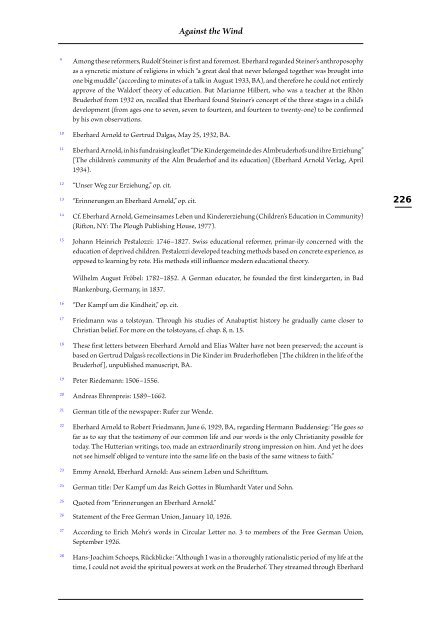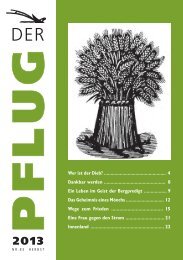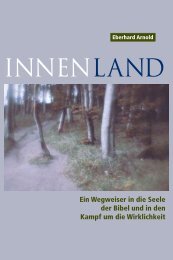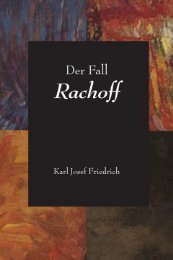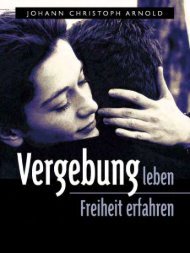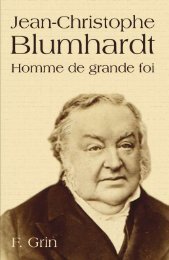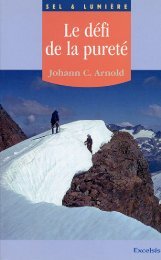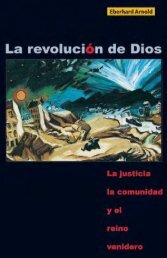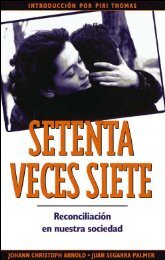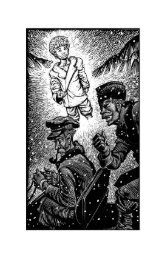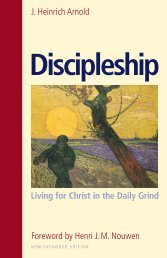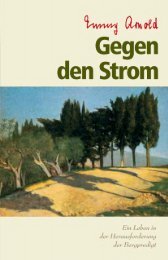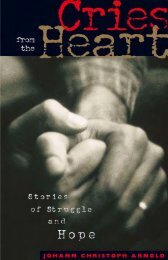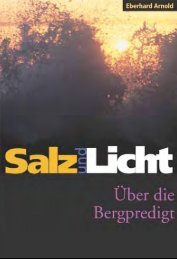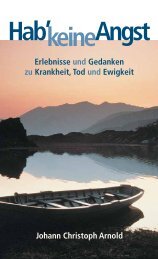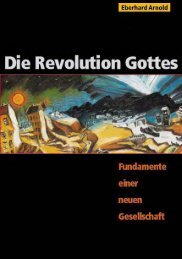Against the Wind: Eberhard Arnold and the Bruderhof - Plough
Against the Wind: Eberhard Arnold and the Bruderhof - Plough
Against the Wind: Eberhard Arnold and the Bruderhof - Plough
Create successful ePaper yourself
Turn your PDF publications into a flip-book with our unique Google optimized e-Paper software.
<strong>Against</strong> <strong>the</strong> <strong>Wind</strong><br />
9 Among <strong>the</strong>se reformers, Rudolf Steiner is first <strong>and</strong> foremost. <strong>Eberhard</strong> regarded Steiner’s anthroposophy<br />
as a syncretic mixture of religions in which “a great deal that never belonged toge<strong>the</strong>r was brought into<br />
one big muddle” (according to minutes of a talk in August 1933, BA), <strong>and</strong> <strong>the</strong>refore he could not entirely<br />
approve of <strong>the</strong> Waldorf <strong>the</strong>ory of education. But Marianne Hilbert, who was a teacher at <strong>the</strong> Rhön<br />
<strong>Bruderhof</strong> from 1932 on, recalled that <strong>Eberhard</strong> found Steiner’s concept of <strong>the</strong> three stages in a child’s<br />
development (from ages one to seven, seven to fourteen, <strong>and</strong> fourteen to twenty-one) to be confirmed<br />
by his own observations.<br />
10 <strong>Eberhard</strong> <strong>Arnold</strong> to Gertrud Dalgas, May 25, 1932, BA.<br />
11 <strong>Eberhard</strong> <strong>Arnold</strong>, in his fundraising leaflet “Die Kindergemeinde des Almbruderhofs und ihre Erziehung”<br />
[The children’s community of <strong>the</strong> Alm <strong>Bruderhof</strong> <strong>and</strong> its education] (<strong>Eberhard</strong> <strong>Arnold</strong> Verlag, April<br />
1934).<br />
12 “Unser Weg zur Erziehung,” op. cit.<br />
13 “Erinnerungen an <strong>Eberhard</strong> <strong>Arnold</strong>,” op. cit. 226<br />
14 Cf. <strong>Eberhard</strong> <strong>Arnold</strong>, Gemeinsames Leben und Kindererziehung (Children’s Education in Community)<br />
(Rifton, NY: The <strong>Plough</strong> Publishing House, 1977).<br />
15 Johann Heinrich Pesalozzi: 1746–1827. Swiss educational reformer, primar-ily concerned with <strong>the</strong><br />
education of deprived children. Pesalozzi developed teaching methods based on concrete experience, as<br />
opposed to learning by rote. His methods still influence modern educational <strong>the</strong>ory.<br />
Wilhelm August Fröbel: 1782–1852. A German educator, he founded <strong>the</strong> first kindergarten, in Bad<br />
Blankenburg, Germany, in 1837.<br />
16 “Der Kampf um die Kindheit,” op. cit.<br />
17 Friedmann was a tolstoyan. Through his studies of Anabaptist history he gradually came closer to<br />
Christian belief. For more on <strong>the</strong> tolstoyans, cf. chap. 8, n. 15.<br />
18 These first letters between <strong>Eberhard</strong> <strong>Arnold</strong> <strong>and</strong> Elias Walter have not been preserved; <strong>the</strong> account is<br />
based on Gertrud Dalgas’s recollections in Die Kinder im <strong>Bruderhof</strong>leben [The children in <strong>the</strong> life of <strong>the</strong><br />
<strong>Bruderhof</strong>], unpublished manuscript, BA.<br />
19 Peter Riedemann: 1506–1556.<br />
20 Andreas Ehrenpreis: 1589–1662.<br />
21 German title of <strong>the</strong> newspaper: Rufer zur Wende.<br />
22 <strong>Eberhard</strong> <strong>Arnold</strong> to Robert Friedmann, June 6, 1929, BA, regarding Hermann Buddensieg: “He goes so<br />
far as to say that <strong>the</strong> testimony of our common life <strong>and</strong> our words is <strong>the</strong> only Christianity possible for<br />
today. The Hutterian writings, too, made an extraordinarily strong impression on him. And yet he does<br />
not see himself obliged to venture into <strong>the</strong> same life on <strong>the</strong> basis of <strong>the</strong> same witness to faith.”<br />
23 Emmy <strong>Arnold</strong>, <strong>Eberhard</strong> <strong>Arnold</strong>: Aus seinem Leben und Schrifttum.<br />
24 German title: Der Kampf um das Reich Gottes in Blumhardt Vater und Sohn.<br />
25 Quoted from “Erinnerungen an <strong>Eberhard</strong> <strong>Arnold</strong>.”<br />
26 Statement of <strong>the</strong> Free German Union, January 10, 1926.<br />
27 According to Erich Mohr’s words in Circular Letter no. 3 to members of <strong>the</strong> Free German Union,<br />
September 1926.<br />
28 Hans-Joachim Schoeps, Rückblicke: “Although I was in a thoroughly rationalistic period of my life at <strong>the</strong><br />
time, I could not avoid <strong>the</strong> spiritual powers at work on <strong>the</strong> <strong>Bruderhof</strong>. They streamed through <strong>Eberhard</strong>


